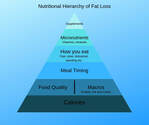
Recently I posted this visual of the Nutritional Hierarchy of Fat Loss on the Swole Sisters Worldwide Facebook page. Meal timing seemed to pique the interest of the community members so I've decided to cover how you can manipulate meal timing in order to change your body composition.
It's not that meal timing is the most important factor in fat loss, in fact it is a ways up the pyramid however it is a topic that ignites debate on many fronts. I'll be covering meal timing as it relates to overall calorie consumption as in when fat loss is the goal. It is important to note that these strategies may or may not work for you. Please don't read this article and think you have to start implementing everything on this list. Instead see if any of these strategies might be EASILY incorporated in to your life, then try it for a while and see if it helps with your results.
1. Eat Breakfast or Don't
Here we have our first example of how 2 totally opposing strategies can work for different people. Initially we were told that we should eat breakfast because it would start "stoking" the supposed fire of our metabolism. Eating first thing in the morning won't do anything magical to your metabolism unfortunately, but it can be helpful if you're trying to lose weight. Eating a protein rich breakfast in the morning could help prevent overeating later in the day. Do you find yourself snacking in the late afternoon or overeating after work? Maybe a more consistent breakfast is the key to feeling more sated. The caveat to this is that you include protein with this meal. A giant bowl of fruit loops does not a nutritious breakfast make, even if the box claims they're "Whole Grain". On the other end of the spectrum is Intermittent Fasting where you keep your eating within a "feeding window". For example if you have your last meal at 7pm and you fast for 16 hours before eating again, your first meal the next meal would be at 11am the next day. By skipping breakfast you're basically removing one meal from your day and by default cutting some calories UNLESS you gorge yourself 11am - 7pm. There are many different protocols for Intermittent Fasting and it would take some experimentation to see if it was a good fit for you. I have seen it suggested many times that women keep their fasting window a little shorter (12-14 hours) versus some of the longer fasting windows that men respond well to.
2. Don't Eat 1-2 Hours Before Bed
I am often asked if people NEED to stop eating 2 hours before bed. Honestly there's nothing magical about finishing your last meal by 6pm and if your lifestyle doesn't allow for it, then don't worry too much about when you eat dinner. The only cause for concern will be when you overeat late at night and then that messes with your sleep. I also find it challenging to fall asleep when I'm hungry so I'd rather have a later meal than try to fall asleep hungry. Putting a cap on how late you eat can be most beneficial for people who find themselves snacking at night. You're probably not eating a pint of ice cream because you're hungry, there's something else going on there. You're most likely bored and/or anxious. Deciding to stop eating by a certain time might help curb late night snacking and therefore help you reduce your overall calorie intake.
3. Work Out Fasted or Don't
Once again you have a few options here. Some people swear by fasted morning workouts. This means you'd wake up, work out and wait to eat your first meal until after your workout. Particularly if you work out early in the morning, there may not be time to digest a breakfast before hand so you may want to try a fasted workout. Is there any fat burning magic to working out fasted? I doubt it, but if it helps you get your work out in because you don't have to spend time preparing/eating before hand than it could be a good strategy. I know other people who get dizzy and light headed in the morning so they need to have at least a little something first thing or it will be a very unpleasant workout. Personally I could do a little cardio or an upper body workout without breakfast but if I hit my legs I'll fuel up first. I'd rather eat and perform better in the gym than skip breakfast and have a weak work out.
4. Find Your Meal # Sweet Spot
As breakfast used to be considered necessary to stoke your metabolism, it was once thought that eating every 2-3 hours was important to keep that sucker fired up. Once again, overall calorie intake is the biggest factor in fat loss so you should figure out what your sweet spot is. Eating every 2-3 hours may be great for you. It could keep hunger low so that you're less likely to overeat. On the other hand your job may not allow for constant grazing so you could go with the traditional 3 meals. Personally I like larger meals so the 5-6 small meal approach is unsatisfying. Instead I eat 4 meals of relatively equal size.
It may seem frustrating that there's no set answer here. What if there were a "right" answer but it didn't work at all with your schedule? Wouldn't that be more of a bummer? This way you get to find what helps you feel the most energetic and what works with your lifestyle. It gives you a chance to be in tune with your own body rather than at the mercy of the latest diet trend.
Have you found this information helpful? You can find more information like it at the Swole Sisters Worldwide Facebook page. Ask to join and be part of a supportive community of women. Want more quality information sent right to your inbox? Sign-up for my weekly email below.
0 Comments
|
AuthorWrite something about yourself. No need to be fancy, just an overview. Archives
February 2020
Categories |
What my clients are saying about me:"Now that I've worked with Jen I see the value of having a trainer. She helps keep me on track and focused. I'm a busy mom and it's nice to have someone I trust give me my work outs. No more researching workouts in magazines or instagram. I get my own personalized program that works with my schedule and helps me achieve my goals faster." |
Contact Us |
